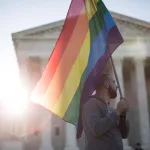Editor’s note: Glenn Youngkin is projected to win the Virginia governor’s race.
For most Americans, the question of whether or not LGBTQ+ couples should be allowed to marry has long been settled. Or at least it was.
But in Virginia, Glenn Youngkin, the Republican nominee for governor, says he’s personally against same-sex marriage. He’s running against former Gov. Terry McAuliffe, a Democrat, in a race that’s being watched for what it says about Americans’ views of the Biden administration. For LGBTQ+ advocates, it’s also about whether Virginians will pick a candidate who is against marriage equality, a striking stance for a mainstream candidate of either major party.
Late last month, Youngkin told the Associated Press in an interview that he feels “called to love everyone” but, when asked if that expressed support for same-sex marriage, said, “No.” He said it was “legally acceptable” in the state and he would support the law.
LGBTQ+ rights organization the Human Rights Campaign blasted Youngkin as out of touch with mainstream America.
“His relentless anti-equality messaging as he closes out his campaign is proof that fundamental fairness and equality are at stake in this election, Joni Madison, the group’s interim president, said in a statement.
McAuliffe rushed to highlight his own history of backing LGBTQ+ rights in Virginia, noting on Twitter that he was “proud to be the first Southern governor to officiate a same-sex wedding.”
In a statement to The 19th, the Youngkin campaign further clarified the candidate’s stance as a private matter and pointed to other, more inclusive stances he had taken during the campaign.
“As Glenn said, gay marriage is the law in Virginia and he will support the law as governor,” the campaign said. “Glenn spoke up when pride flags were destroyed because he believes in respecting everyone and protecting everyone.”
Still, Youngkin’s public opposition to marriage equality troubles those who have considered the issue settled. According to Gallup, support for queer marriage rights in the United States is at an all-time high at 70 percent. A majority of Republicans also now support marriage equality.
Virginians have also shown strong support for LGBTQ+ residents in recent years. According to the Public Religion Research Institute, 60 percent of Virginians backed marriage equality as of 2017. That same year, the state elected the county’s first out transgender representative, Danica Roem. This year, the legislature voted overwhelmingly to wipe its unenforceable marriage ban from the books.
This year however, transgender people have weathered a year of unprecedented political attacks nationwide. Ten anti-trans bills have been signed into law this year in other states. The Equality Act, federal legislation that would grant nondiscrimination protections to LGBTQ+ people nationwide and a key Biden agenda item, has stalled short of votes in the Senate.
A year ago, while declining to hear a case, Justices Clarence Thomas and Samuel Alito on the Supreme Court indicated that marriage equality should be overturned, a move that sent shockwaves through the queer legal community as the court prepared to confirm another conservative justice, Amy Coney Barrett. Equality rights organizations fiercely opposed her confirmation because of her past ties to a far-right anti-LGBTQ+ organization, the Alliance Defending Freedom.
Youngkin’s stance against LGBTQ+ unions has sent up red flags for queer political organizers who fear they are losing ground on the swift progress gained since the Supreme Court declared marriage equality the law of the land in 2015.
Lucas Acosta, a senior spokesperson for Democratic National Committee and longtime queer rights activist, said he anticipated backlash after 2020 presidential election and in response to the Biden administration backing LGBTQ+ rights early on.
“What does surprise me is the fact that even now, some Virginia voters still consider Glenn Youngkin a moderate,” he said. “Solely based on this position alone, he cannot call himself a moderate, and I think that that is on us in the campaign in these closing days, to really drive home for voters across the state.”
Polling shows a tight race in Virginia, which Biden won by 10 points last year. All 100 seats in the state House of Delegates are also up for grabs, and Democrats are defending a 55-45 majority there.






